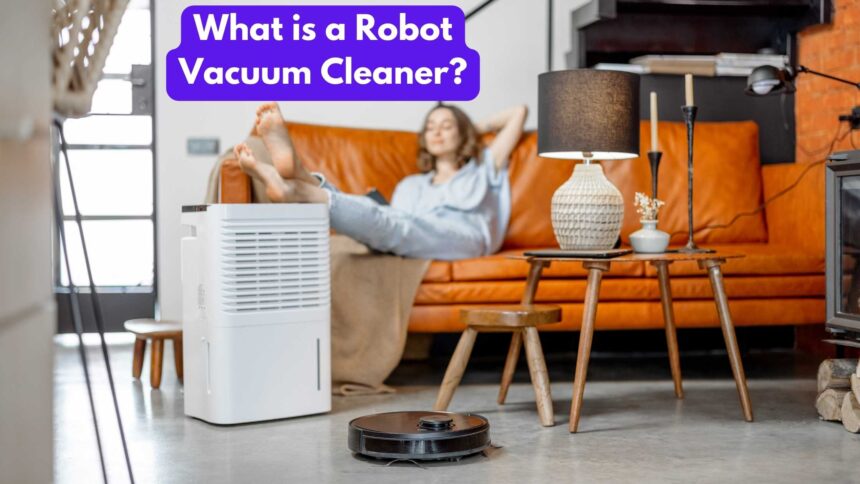What is a Robot vacuum Cleaner?
It is a Hands-Free Floor Cleaning. A robot vacuum cleaner, also sometimes called a Robovac or even a Roomba (which is a brand name), is an autonomous cleaning device. It essentially acts like a miniature robotic vacuum that uses a combination of sensors, brushes, and suction to clean your floors. Imagine coming home to clean floors without ever lifting a finger. That’s the magic of robot vacuum cleaners. These autonomous devices are transforming homes by taking care of dust, dirt, and pet hair with minimal effort.
How Robot Vacuums Work?

Robot vacuums are marvels of miniaturized technology. Core functionalities: Here’s an overview of their main features.
- Navigation: These cleaners use a combination of sensors (infrared, LiDAR) to map your home and navigate obstacles. Some models even create virtual maps for zone cleaning.
- Cleaning System: They employ a combination of rotating brushes and powerful suction to loosen, capture, and deposit dirt into a built-in dustbin.
- Self-Programming: Many robot vacuums allow you to schedule cleaning sessions, set virtual boundaries, and control them remotely using a smartphone app.
Types of Robot Vacuum Cleaners

The world of robot vacuums offers a variety of options to suit your needs:
- Basic Models: These are ideal for small spaces and offer core cleaning features like random navigation and bump sensors.
- Advanced Models: Packed with features like smart mapping, app control, and voice assistant integration, these provide a more customized cleaning experience.
- Robovac Mops: These multifunctional robots not only vacuum but also mop your floors, offering a comprehensive cleaning solution.
Advantages and Disadvantages of Robot Vacuum Cleaners
Advantages:
- Convenience and Time-Saving: Robot vacuums free up your time for other activities by handling routine cleaning.
- Effortless Maintenance: Schedule cleaning sessions and forget about vacuuming!
- Accessibility: They can clean under furniture and in tight spaces, reaching areas traditional vacuums might miss.
- Allergy Relief: Regular cleaning with robot vacuums can help reduce allergens like dust and pet dander.
Disadvantages:
- Cost: Robot vacuums can be a significant investment compared to traditional vacuums.
- Limited Cleaning Power: They might not be as effective on high-pile carpets or for deep cleaning.
- Obstacles and Stairs: They may struggle with navigating obstacles like cords or climbing stairs.
Popular Robot Vacuum Cleaner Brands: Includes costs and reviews.
Here are some of the leading robot vacuum cleaner brands to consider:
- iRobot Roomba: A pioneer in the industry, offering a wide range of models with prices starting around $200 and going up to $1000 for high-end features.
- Shark IQ Robot Self-Empty XL R101AE: This model is famous for its strong suction and self-emptying base, with prices starting at about $400.
- Neato Robotics: These D-shaped robots boast exceptional corner cleaning and come in a price range of $300 to $700.
- Samsung Jet Bot AI+: These smart robot vacuums with object recognition start around $700 and offer top-of-the-line features.
Note: Prices may vary depending on the model and retailer It’s important to read online reviews to get a better understanding of user experiences and specific model capabilities before making a purchase.
Precautions While Using a Robot Vacuum Cleaner

- Pick up loose objects: Remove electrical cords, toys, and other items that could tangle the robot.
- Secure furniture: Ensure furniture with legs is secured or has furniture risers to prevent the robot from getting stuck.
- Empty the dustbin regularly: Maintain optimal cleaning performance by emptying the dustbin after each use or as recommended by the manufacturer.
- Maintain brushes and filters: Regularly clean and replace brushes and filters to ensure proper suction and airflow.
What is Home Automation? and How it works?
Conclusion:
Robot vacuums are a powerful innovation for hands-free floor cleaning. While they may not entirely replace traditional vacuums for deep cleaning or tackling high-pile carpets, they offer undeniable advantages. Their convenience, time-saving features, and ability to reach under furniture make them ideal for busy households and allergy sufferers. As technology continues to advance, robot vacuums are likely to become even more sophisticated, offering a truly comprehensive cleaning solution.
FAQ’s of Robot vacuums
- Can Robot vacuum clean carpets?
Yes, most robot vacuums can clean carpets, although some might struggle with high-pile carpets. - Do Robot vacuums work on pet hair?
Many robot vacuums are designed to handle pet hair with specialized brushes and strong suction. - How long do robot vacuums operate on a single charge?
Run time varies depending on the model, but most offer 30-120 minutes of cleaning per charge. - Are robot vacuums good for allergies?
By regularly removing dust and allergens, robot vacuums can be helpful for allergy sufferers.





So informative